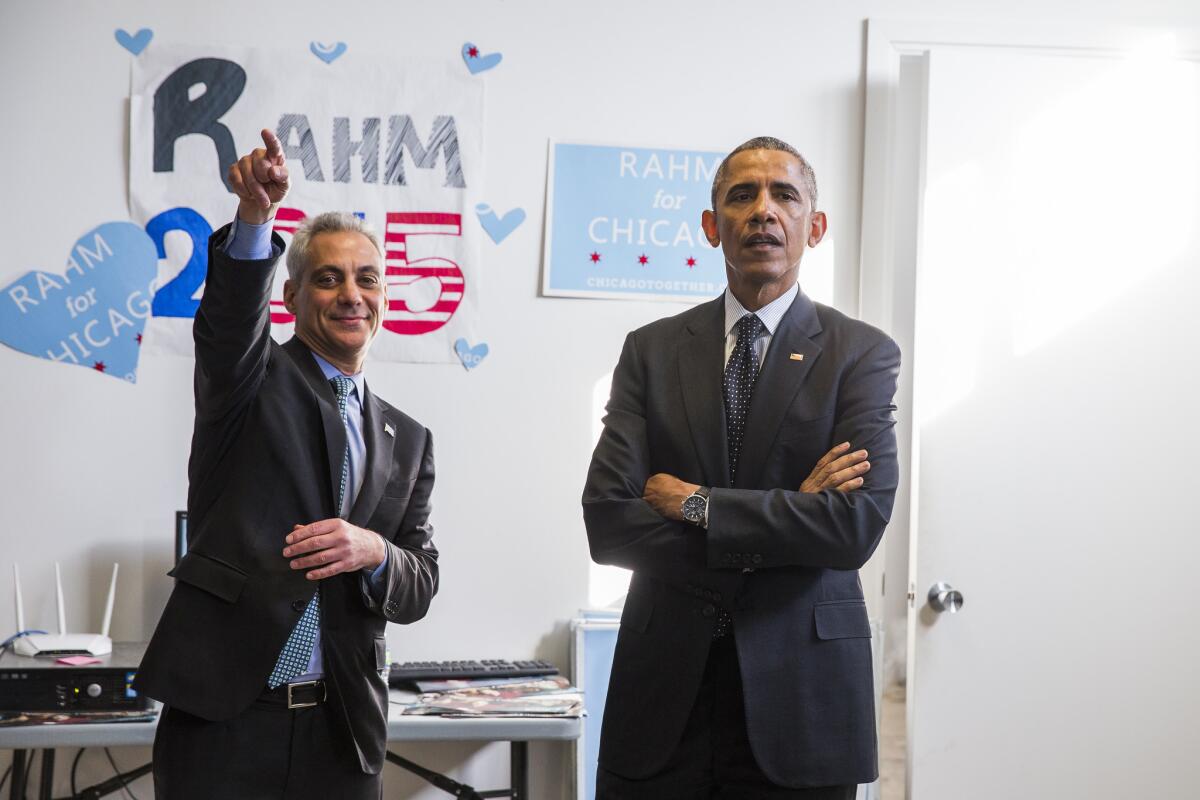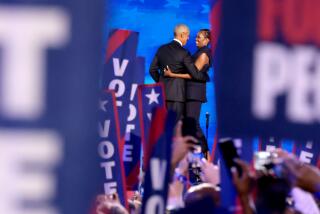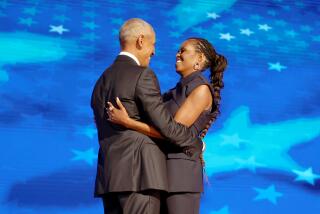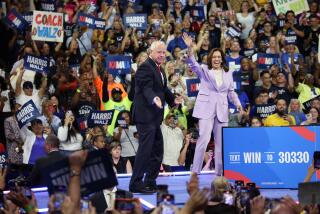Chicago Mayor Rahm Emanuel facing tough campaign

President Obama makes a campaign stop for Chicago Mayor Rahm Emanuel in Chicago on Thursday.
President Obama flew back to his hometown the other day to dedicate a new national monument, an event also pulling double duty as a tacit reelection boost for Mayor Rahm Emanuel in his quest to win a second term Tuesday without being forced into a humbling runoff.
With Emanuel at his side, Obama bestowed the honor on remnants of the Pullman factory district, a historic slice of Chicago that played a critical role in the Great Migration of blacks from the rural South during the era of Jim Crow.
The political choreography for Emanuel was about as subtle as one of the profanity-laced tirades he became known for over his years as a Washington powerbroker.
Emanuel got to remind voters of his clout with Obama, whom he once served as White House chief of staff, as well as his ability to land high-profile economic plums for the city. It was also an opportunity to appeal to black voters, who had soured on Emanuel over school closings and persistent street violence.
Indeed, Obama prefaced his remarks about Pullman with an enthusiastic “attaboy” for Emanuel.
“He’s fought for new opportunity and new jobs in Pullman, and for every Chicagoan, in every neighborhood, making sure every single person gets the fair shot at success that they deserve,” said Obama, who later visited an Emanuel campaign office.
Emanuel should emerge as the top vote-getter in Tuesday’s five-candidate field for mayor.
An enormous fundraising edge has allowed the incumbent to dominate the local airwaves for months with ads boasting of his accomplishments. A just released Chicago Tribune poll shows him holding a 45% to 20% edge over his closest rival, Cook County Board member Jesus “Chuy” Garcia.
But election rules require that Emanuel score more than 50% of the vote Tuesday to win a second term outright. Failing that, he would be forced into a second round of balloting April 7 against a single challenger, likely Garcia, giving the fractured opposition to Emanuel a chance to coalesce and change the election dynamic.
Chicago is known for a hearty embrace of political dynasties through thick and thin, so Emanuel’s difficulty in sealing the reelection deal is intriguing.
His toughest potential rival, Chicago Teachers Union President Karen Lewis, dropped plans to challenge Emanuel after she received a cancer diagnosis. Lewis, who led a 2012 strike by teachers that gained them higher pay, is one of the few public figures in the city to stare down Emanuel and make him blink.
From the sidelines, Lewis continues to tweak Emanuel as an out-of-touch Washington know-it-all doing the bidding of “hedge-fund homies” who have poured millions of dollars into his campaign.
Her critique touches on a likeability gap for Emanuel that has been of enough concern for his campaign to address it head on.
“Now, some of you might have heard that Rahm Emanuel might not be known as a warm and fuzzy, try-to-please everyone, super-likable kind of guy,” said City Clerk Susana Mendoza, Emanuel’s reelection co-chair, at his campaign kickoff event. “That’s OK. Here’s what he is: He’s a walk-it-like-he talks-it, hard-charging with a purpose, visionary leader who is a decisive doer.”
The spin from Emanuel, himself, is that congeniality is somewhat overrated. “The core part of politics is about leading, not about popularity,” he declared during a recent debate. “Leading requires telling people the truth, the hard truth and doing the necessary things.”
Whether Emanuel has lived up to that standard is a focus of the drive to unseat him, with critics complaining of a leadership style that is longer on boasts than delivery.
An example involves Emanuel’s oft-repeated claim that he has improved the city’s bottom line and expanded critical services without having to resort to increases in the property, sales or gas taxes.
Left unsaid, however, is that he has sharply increased and expanded fines and fees while also failing to defuse a sputtering pension-costs time bomb that threatens to explode the city budget.
Emanuel also takes credit for ushering in a new era of transparency and tougher ethics rules for a city government long marred by scandal. At the same time, a recent Tribune investigation demonstrated how he has showered an elite circle of political donors with lucrative City Hall benefits, skirting the spirit of his own rules if not the letter.
On the campaign trail, Emanuel likes to focus on mass transit infrastructure improvements he has pushed as well as a successful effort to hike the city’s minimum wage in stages to $13 per hour.
He also stresses education initiatives, including expanded kindergarten and pre-K programs and a new emphasis at Chicago’s City Colleges on aligning training with the labor needs of growth industries.
His problems with minority voters stem largely from two issues. Many harbor resentment over Emanuel’s decision to close 50 neighborhood schools in 2013, most largely serving black and Latino students. The closures were announced when Emanuel was out of town on a ski vacation with his family.
Emanuel says the mass shutdown was the hardest action he has had to take as mayor, but the facilities were under-enrolled and a drain on resources that have now been redirected to finance more robust school programs.
Early in his term, minority neighborhoods were also rocked by a spike in shooting deaths. The spike followed a decision by Emanuel and his hand-picked police superintendent to disband police saturation squads that had been useful in tamping down violence.
The homicide problem eased, though it hardly went away, after Emanuel reprised the saturation policing strategy — at a huge financial price. Overtime costs for police are now near $100 million a year, giving Emanuel’s campaign opponents an opening to argue he is callous to street violence and a police force he is burning out to avoid hiring more officers.
A play-it-safe campaign strategy has helped Emanuel avoid tough questioning about his approach to crime-fighting and other controversial issues.
Emanuel repeatedly has declined interviews to discuss his job as mayor, his campaign fundraising and his reelection bid.
His campaign events are often invitation-only. He rarely strays from the same memorized talking points on various issues. And he has projected a cold sense of calm at all times, exhibiting a campaign trail demeanor that is at direct odds with the legend of him as a profanity-spewing spitfire that grew from his time in Washington as a congressman and top aide in the Obama and Clinton White Houses.
Through such discipline, Emanuel has been careful to avoid campaign missteps. At the same time, however, it has imbued his campaign with a spirit that might be best summed up as “meh.”
Recently, Alderman Carrie Austin found herself having to chide a gathering of 150 black business, religious and government leaders organized to demonstrate enthusiasm in the African American community for Emanuel’s reelection.
“Let me say that again, y’all ain’t clapping,” Austin snapped at one point.
After Emanuel spoke briefly and drew tepid applause, a young aide tried without much success to rouse the crowd into a chant of “four more years!”
The mayor quickly shook half a dozen hands and made a break for the back door, where he dodged a throng of photographers with cameras and reporters with questions.
bsecter@tribune.com
Twitter: @bobsecter
More to Read
Sign up for Essential California
The most important California stories and recommendations in your inbox every morning.
You may occasionally receive promotional content from the Los Angeles Times.










